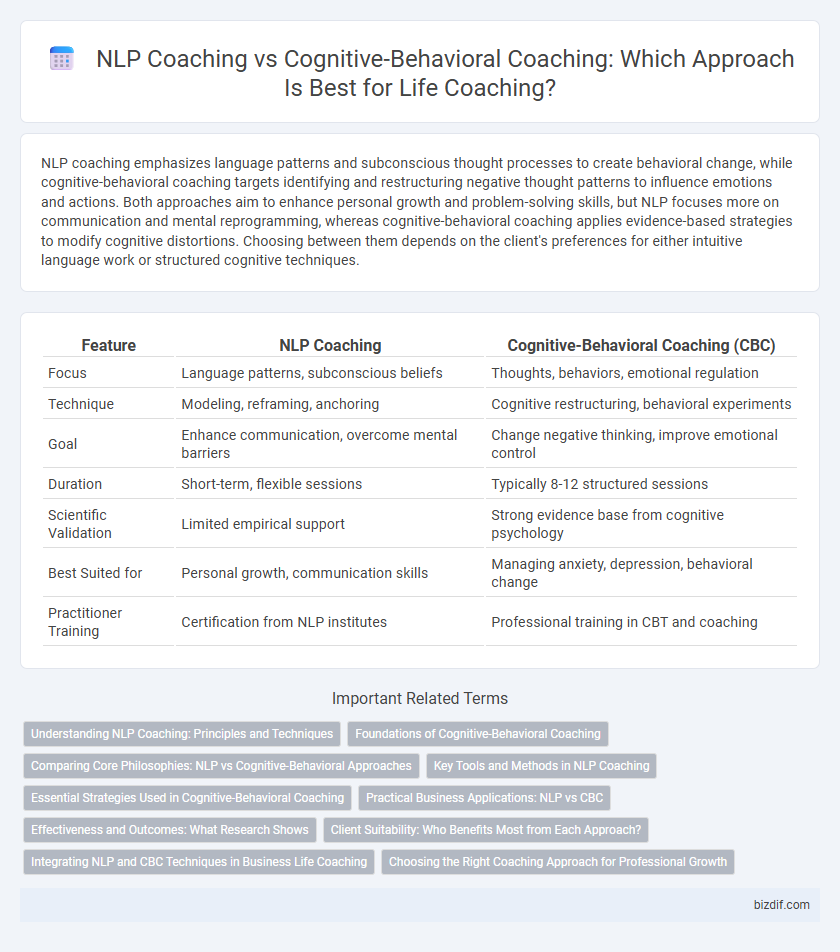NLP coaching emphasizes language patterns and subconscious thought processes to create behavioral change, while cognitive-behavioral coaching targets identifying and restructuring negative thought patterns to influence emotions and actions. Both approaches aim to enhance personal growth and problem-solving skills, but NLP focuses more on communication and mental reprogramming, whereas cognitive-behavioral coaching applies evidence-based strategies to modify cognitive distortions. Choosing between them depends on the client's preferences for either intuitive language work or structured cognitive techniques.
Table of Comparison
| Feature | NLP Coaching | Cognitive-Behavioral Coaching (CBC) |
|---|---|---|
| Focus | Language patterns, subconscious beliefs | Thoughts, behaviors, emotional regulation |
| Technique | Modeling, reframing, anchoring | Cognitive restructuring, behavioral experiments |
| Goal | Enhance communication, overcome mental barriers | Change negative thinking, improve emotional control |
| Duration | Short-term, flexible sessions | Typically 8-12 structured sessions |
| Scientific Validation | Limited empirical support | Strong evidence base from cognitive psychology |
| Best Suited for | Personal growth, communication skills | Managing anxiety, depression, behavioral change |
| Practitioner Training | Certification from NLP institutes | Professional training in CBT and coaching |
Understanding NLP Coaching: Principles and Techniques
NLP coaching utilizes Neuro-Linguistic Programming principles to reframe thought patterns and language for enhanced personal development and communication skills. It focuses on techniques such as anchoring, visualization, and rapport-building to access unconscious resources and facilitate behavior change. This approach differs from cognitive-behavioral coaching, which emphasizes restructuring cognitive distortions and adopting healthier thought processes through evidence-based psychological strategies.
Foundations of Cognitive-Behavioral Coaching
Foundations of Cognitive-Behavioral Coaching (CBC) emphasize identifying and restructuring dysfunctional thoughts to promote positive behavioral change, rooted in cognitive-behavioral therapy principles. Unlike NLP coaching, which focuses on language patterns and subconscious communication, CBC relies on evidence-based techniques to challenge cognitive distortions and develop practical coping strategies. CBC's structured approach enhances self-awareness and resilience, making it a preferred method for clients seeking measurable and sustainable outcomes in personal development.
Comparing Core Philosophies: NLP vs Cognitive-Behavioral Approaches
Neuro-Linguistic Programming (NLP) coaching emphasizes the power of language patterns and sensory experiences to reprogram the subconscious mind for desired outcomes. Cognitive-Behavioral coaching focuses on identifying and restructuring dysfunctional thoughts and behaviors to promote rational decision-making and emotional regulation. The core philosophy of NLP centers on subjective realities and linguistic frameworks, while cognitive-behavioral coaching relies on evidence-based cognitive restructuring techniques targeting thought-behavior-emotion links.
Key Tools and Methods in NLP Coaching
NLP coaching utilizes key tools such as sensory acuity, anchoring, and reframing to enhance clients' self-awareness and behavior patterns. Techniques like language pattern analysis and visualization help in restructuring limiting beliefs and fostering positive mindset shifts. These methods differ from cognitive-behavioral coaching by emphasizing non-verbal communication cues and subconscious processes for lasting transformational change.
Essential Strategies Used in Cognitive-Behavioral Coaching
Cognitive-behavioral coaching employs essential strategies such as identifying and challenging negative thought patterns, setting specific and achievable goals, and practicing behavioral experiments to create lasting change. Techniques include cognitive restructuring, behavioral activation, and developing coping skills to manage stress and improve emotional regulation. Unlike NLP coaching, which emphasizes language patterns and subconscious programming, cognitive-behavioral coaching relies on evidence-based methods grounded in psychology to modify cognition and behavior.
Practical Business Applications: NLP vs CBC
NLP coaching leverages language patterns and subconscious reprogramming to enhance communication, sales, and leadership effectiveness in business settings. Cognitive-behavioral coaching (CBC) focuses on identifying and restructuring limiting beliefs and behaviors to improve decision-making, emotional regulation, and goal achievement. Both methodologies offer practical tools for business growth, with NLP excelling in persuasive communication and CBC in durable cognitive restructuring.
Effectiveness and Outcomes: What Research Shows
Neuro-Linguistic Programming (NLP) coaching emphasizes language patterns and subconscious beliefs to enhance personal development, often showing significant improvements in communication skills and emotional resilience. Cognitive-behavioral coaching (CBC) relies on evidence-based techniques targeting thought patterns and behaviors, with research consistently indicating strong outcomes in stress reduction, goal achievement, and problem-solving abilities. Studies comparing both approaches highlight CBC's robust empirical support and effectiveness in managing anxiety and depression, while NLP coaching excels in fostering motivation and confidence.
Client Suitability: Who Benefits Most from Each Approach?
NLP coaching suits clients seeking rapid mindset shifts and enhanced communication skills, especially those open to exploring subconscious patterns and language's impact on behavior. Cognitive-behavioral coaching benefits individuals aiming to identify and modify specific thought patterns and behaviors, making it ideal for clients struggling with anxiety, stress, or goal-oriented challenges. Understanding client suitability helps coaches tailor interventions to maximize personal growth and achieve measurable outcomes.
Integrating NLP and CBC Techniques in Business Life Coaching
Integrating NLP and Cognitive-Behavioral Coaching (CBC) techniques in business life coaching enhances emotional intelligence and decision-making skills by combining NLP's language pattern mastery with CBC's structured behavior modification strategies. This integrated approach empowers leaders to reframe limiting beliefs and develop adaptive cognitive responses, improving workplace communication and resilience under stress. Research shows that blending these methodologies accelerates client transformation by addressing both subconscious patterns and conscious thought processes.
Choosing the Right Coaching Approach for Professional Growth
NLP coaching leverages neuro-linguistic programming techniques to reframe thought patterns and enhance communication skills, promoting rapid behavioral change. Cognitive-behavioral coaching (CBC) focuses on identifying and restructuring negative beliefs to develop practical strategies that improve decision-making and emotional regulation. Selecting the appropriate approach depends on individual goals; NLP suits those seeking transformational mindset shifts, while CBC benefits professionals aiming for structured, evidence-based problem-solving in their growth journey.
NLP coaching vs Cognitive-behavioral coaching Infographic

 bizdif.com
bizdif.com